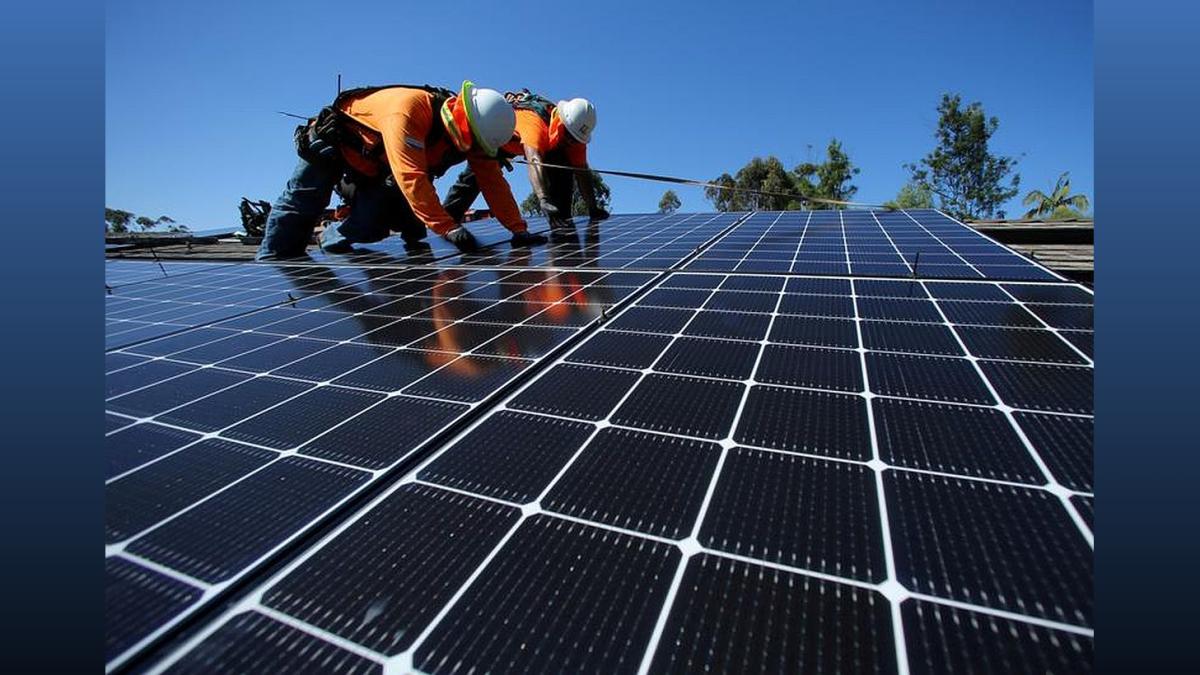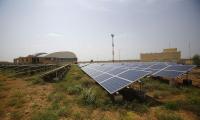COP28: India, China Skip Renewable Energy Pledge
India and China declined to sign a pledge at COP28 to triple global renewable energy capacity by 2030, despite India's previous commitment during its G20 presidency. This move has sparked debate among experts.

Photograph: Mike Blake/Reuters
Dubai, Dec 2 (PTI) India and China both on Saturday refrained from signing the pledge at the COP28 climate summit to triple the world's renewable energy capacity by 2030 even though New Delhi already committed to it as part of its G20 presidency.
During the UN's climate talks here, 118 countries committed to tripling the global renewable energy capacity by 2030 in a highly endorsed initiative.
This ambitious goal aims to reduce the reliance on fossil fuels in the world's overall energy production.
The countries which backed the pledge included Japan, Australia, Canada, Chile, Brazil, Nigeria, and Barbados.
Although China and India have expressed endorsement for the threefold increase in renewable energy by 2030, neither of them formally supported the comprehensive pledge on Saturday.
This commitment involves scaling up clean power alongside a decrease in the utilisation of fossil fuels.
The pledge called for phase down of unabated coal power and putting an end to the financing of new coal-fired power plants.
"Unabated" fossil fuels generally refer to the continued use of coal, oil and gas without efforts to curtail emissions. Nonetheless, a universally accepted and precise definition of this term is currently lacking.
The International Energy Agency says the world must triple its renewable energy capacity and double the rate of energy efficiency by 2030 to drive down demand for fossil fuels and limit global warming to 1.5 degrees Celsius by the end of the century.
India's decision has gauged mixed reactions from Indian experts.
Madhura Joshi, Senior Associate and India Energy Transition Lead at E3G, expressed disappointment over India's decision not to sign the global pledge aiming to triple renewable energy and double energy efficiency by 2030.
These pivotal decisions were initially championed by the Indian G20 presidency and endorsed by G20 leaders in September 2023, Joshi said.
Joshi highlights the significance of transitioning away from fossil fuels, particularly coal, to achieve net-zero commitments. Despite India's ambitious targets for renewable energy, with plans to reach 450GW by 2030, the hope is that New Delhi will endorse these global goals at COP28, leveraging its leadership position in the renewables sector.
Vibhuti Garg, Director of South Asia at the Institute for Energy Economics and Financial Analysis, notes India's commitment to tripling the renewable energy target as part of the G20, reiterated by Prime Minister Narendra Modi at COP28 in Dubai.
While India exhibits serious ambitions for renewable energy, Garg emphasised the country's silence on coal phase-down.
Achieving India's renewable energy goals will necessitate a tripling of investments, prompting the country to advocate for additional funding support from the Global North through blended finance mechanisms, including multilateral development bank (MDB), green bonds, equity investors, and insurance and pension funds, he added.
Ulka Kelkar, the Executive Director of Climate at World Resources Institute (WRI) India, underscored the global target of tripling renewable energy capacity adopted during India's G20 presidency.
She highlighted the magnitude of India's National Determined Contributions (NDC) target, requiring the country to build as much renewable capacity as currently exists on the entire continent of South America.
Kelkar emphasises the transformative impact on various sectors, enabling vehicles, buildings, cookstoves, and industries to run on cleaner electricity.
Additionally, she recognises energy efficiency as a crucial component of the clean energy transition, capable of delivering tangible benefits, especially for micro, small, and medium enterprises.
Dr Ajay Mathur, Director General of the International Solar Alliance, expresses delight at the global commitment to tripling renewable capacity by 2030.
He emphasised the dual benefits of fostering development and mitigating climate change, emphasising the urgency of accelerating the growth of renewables for a successful transition towards clean energy. PTI UZM GVS PY
(This story was produced as part of the 2023 Climate Change Media Partnership, a journalism fellowship organised by Internews' Earth Journalism Network and the Stanley Centre for Peace and Security.
During the UN's climate talks here, 118 countries committed to tripling the global renewable energy capacity by 2030 in a highly endorsed initiative.
This ambitious goal aims to reduce the reliance on fossil fuels in the world's overall energy production.
The countries which backed the pledge included Japan, Australia, Canada, Chile, Brazil, Nigeria, and Barbados.
Although China and India have expressed endorsement for the threefold increase in renewable energy by 2030, neither of them formally supported the comprehensive pledge on Saturday.
This commitment involves scaling up clean power alongside a decrease in the utilisation of fossil fuels.
The pledge called for phase down of unabated coal power and putting an end to the financing of new coal-fired power plants.
"Unabated" fossil fuels generally refer to the continued use of coal, oil and gas without efforts to curtail emissions. Nonetheless, a universally accepted and precise definition of this term is currently lacking.
The International Energy Agency says the world must triple its renewable energy capacity and double the rate of energy efficiency by 2030 to drive down demand for fossil fuels and limit global warming to 1.5 degrees Celsius by the end of the century.
India's decision has gauged mixed reactions from Indian experts.
Madhura Joshi, Senior Associate and India Energy Transition Lead at E3G, expressed disappointment over India's decision not to sign the global pledge aiming to triple renewable energy and double energy efficiency by 2030.
These pivotal decisions were initially championed by the Indian G20 presidency and endorsed by G20 leaders in September 2023, Joshi said.
Joshi highlights the significance of transitioning away from fossil fuels, particularly coal, to achieve net-zero commitments. Despite India's ambitious targets for renewable energy, with plans to reach 450GW by 2030, the hope is that New Delhi will endorse these global goals at COP28, leveraging its leadership position in the renewables sector.
Vibhuti Garg, Director of South Asia at the Institute for Energy Economics and Financial Analysis, notes India's commitment to tripling the renewable energy target as part of the G20, reiterated by Prime Minister Narendra Modi at COP28 in Dubai.
While India exhibits serious ambitions for renewable energy, Garg emphasised the country's silence on coal phase-down.
Achieving India's renewable energy goals will necessitate a tripling of investments, prompting the country to advocate for additional funding support from the Global North through blended finance mechanisms, including multilateral development bank (MDB), green bonds, equity investors, and insurance and pension funds, he added.
Ulka Kelkar, the Executive Director of Climate at World Resources Institute (WRI) India, underscored the global target of tripling renewable energy capacity adopted during India's G20 presidency.
She highlighted the magnitude of India's National Determined Contributions (NDC) target, requiring the country to build as much renewable capacity as currently exists on the entire continent of South America.
Kelkar emphasises the transformative impact on various sectors, enabling vehicles, buildings, cookstoves, and industries to run on cleaner electricity.
Additionally, she recognises energy efficiency as a crucial component of the clean energy transition, capable of delivering tangible benefits, especially for micro, small, and medium enterprises.
Dr Ajay Mathur, Director General of the International Solar Alliance, expresses delight at the global commitment to tripling renewable capacity by 2030.
He emphasised the dual benefits of fostering development and mitigating climate change, emphasising the urgency of accelerating the growth of renewables for a successful transition towards clean energy. PTI UZM GVS PY
(This story was produced as part of the 2023 Climate Change Media Partnership, a journalism fellowship organised by Internews' Earth Journalism Network and the Stanley Centre for Peace and Security.
You May Like To Read
TODAY'S MOST TRADED COMPANIES
- Company Name
- Price
- Volume
- Vodafone-Idea
- 11.36 ( -2.49)
- 94664837
- AvanceTechnologies
- 1.16 (+ 4.50)
- 34522155
- Sunshine-Capital
- 0.26 ( -3.70)
- 29015901
- Alstone-Textiles
- 0.27 ( -3.57)
- 28695959
- Mehai-Technology
- 1.65 ( -4.62)
- 28262795





